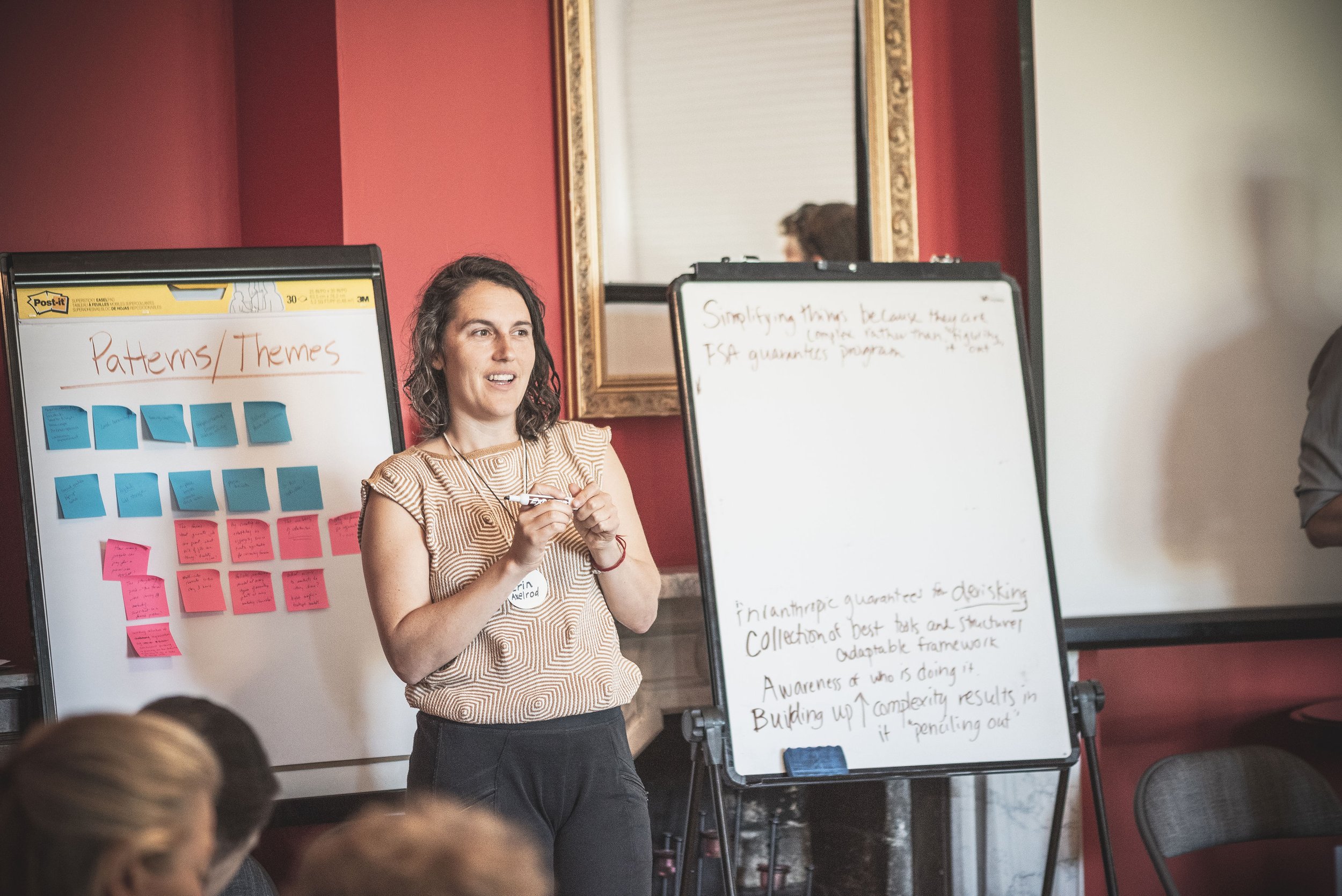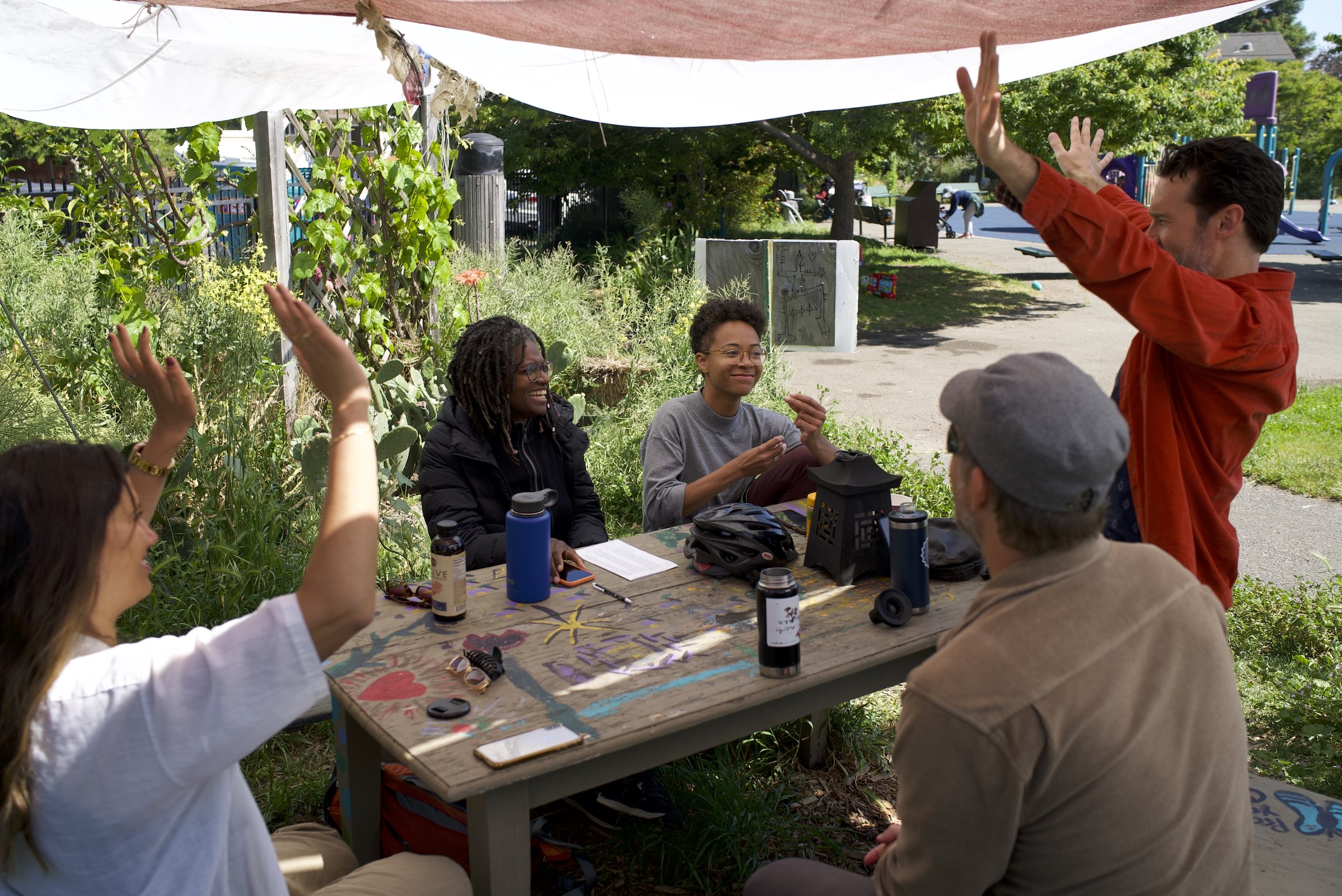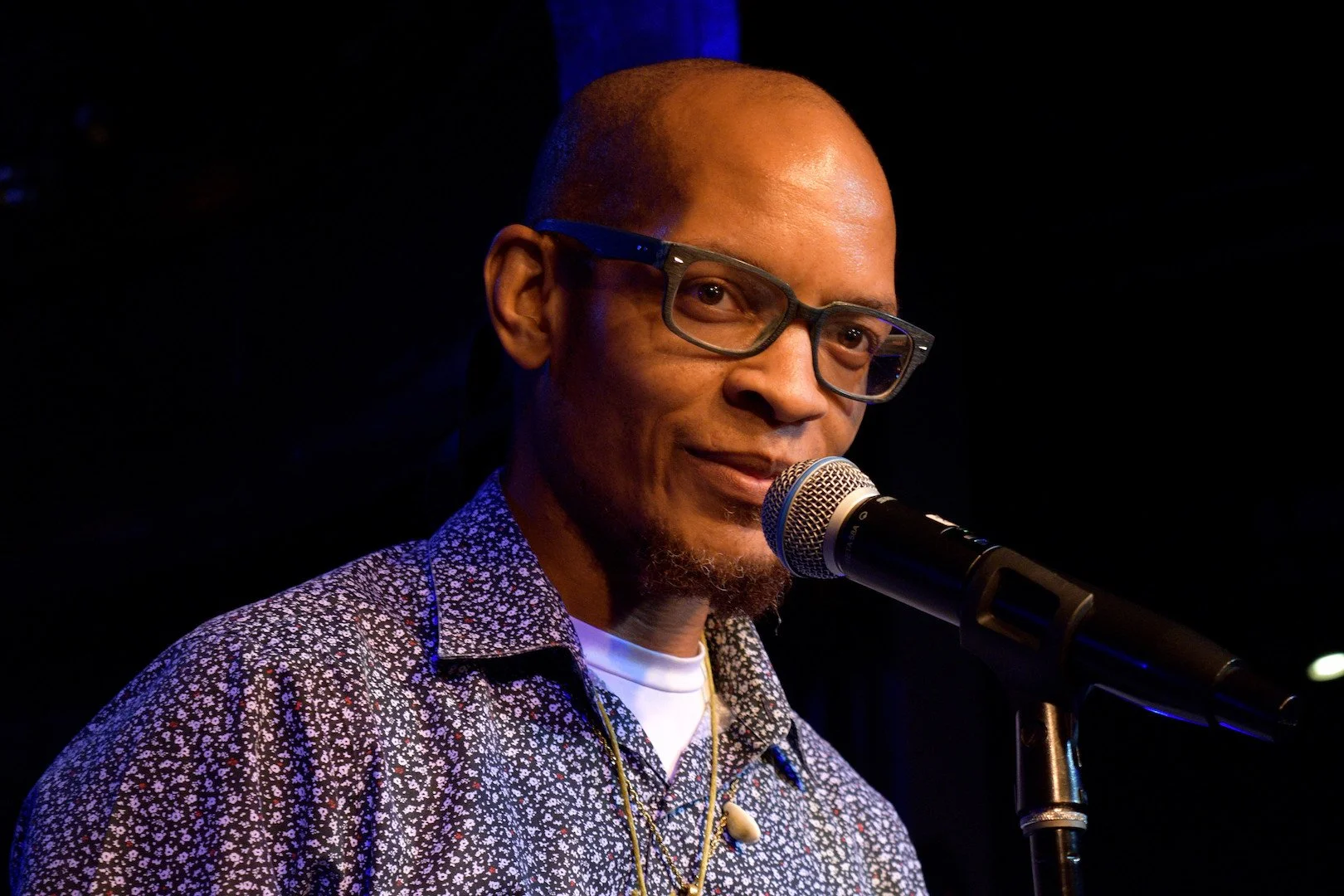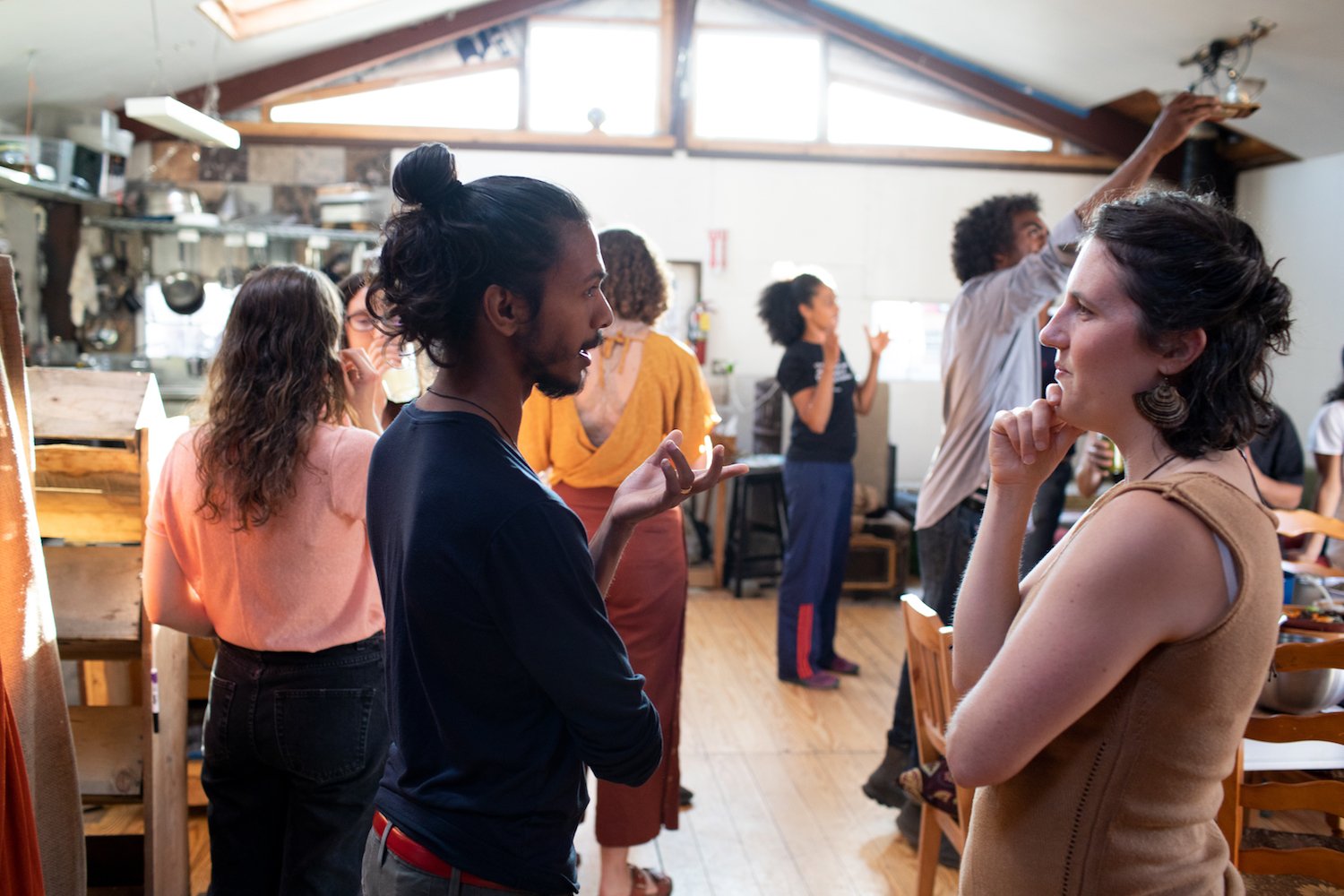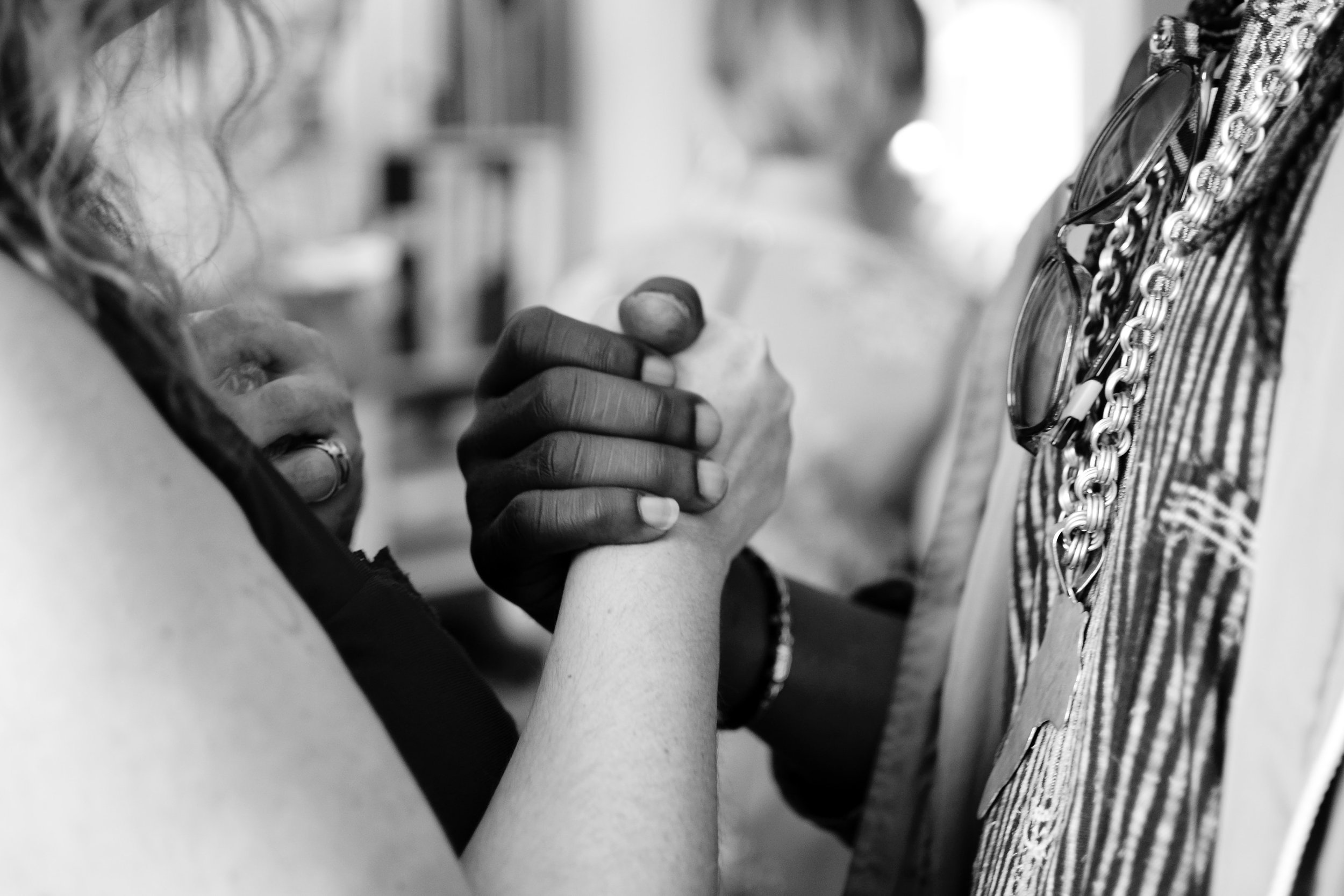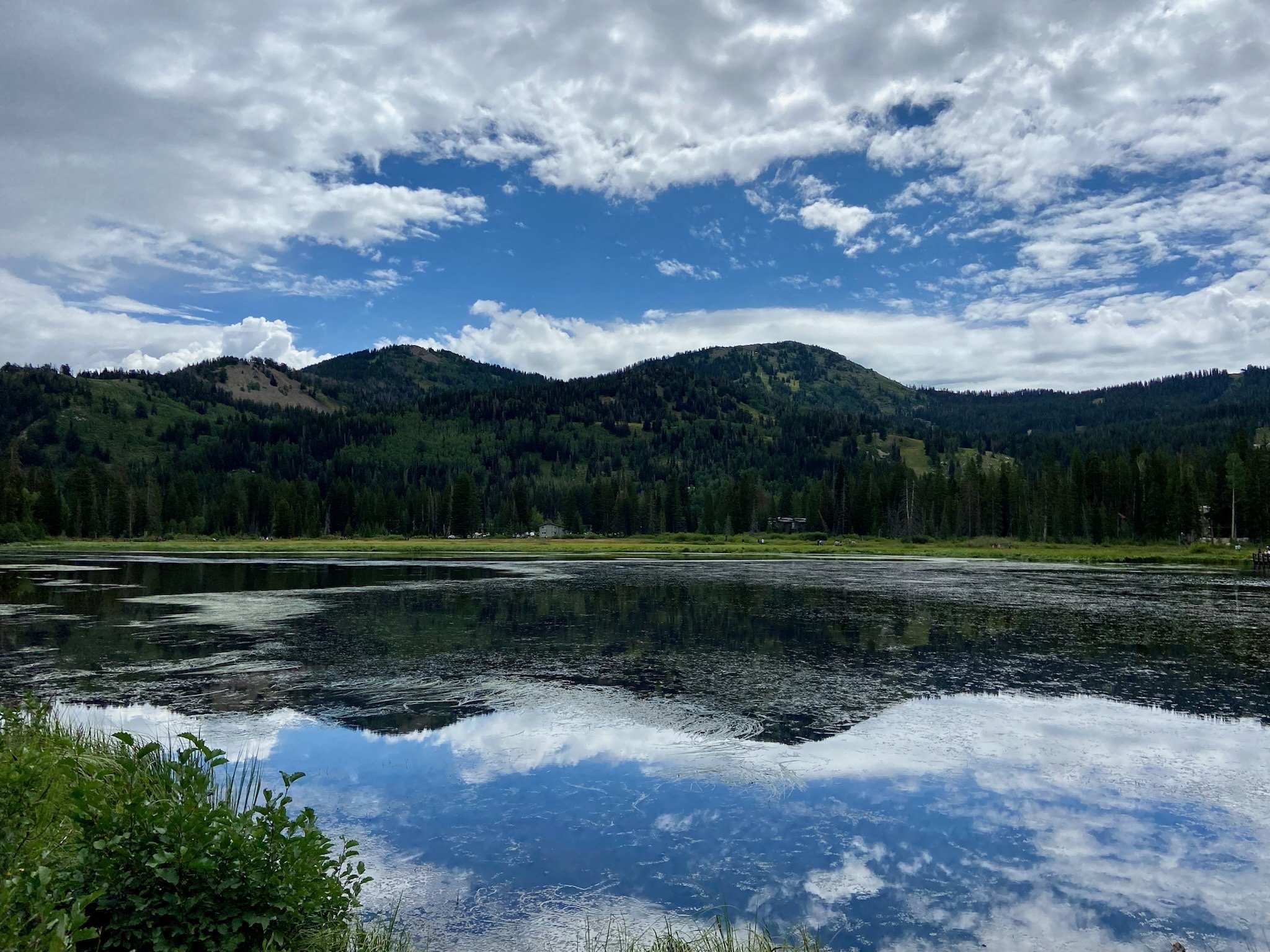How do the personal choices we make for our lives and daily habits impact the larger community and the future of a better world? Learn how Next Economy life design principles can help align our lives with our vision for a more just society.
Ro Horton and Swan Keyes: UNtraining Cultural Conditioning
We discuss the far-reaching effects of cultural conditioning, white people's resistance to recognizing their racism, and the process of “UNtraining” racist programming.
Jorge Fontanez: B Corps as a Force for Change
Consumers need more from the companies and brands they support, and B Corps are paving the way. Learn more about the movement with the CEO of B Corp US & Canada, Jorge Fontanez.
MBA Series (Ep. 7) — Enterprise Structures and Legal Frameworks
The LIFT team discusses the legal and corporate tools that are available to organizations looking to create a meaningful difference, from B Corps to worker-owned cooperatives.
Amrita Wassan: Shifting Power Towards the Solidarity Economy
We cover Amrita's thoughts on what the transition to a better world could look like, and why they are accepting of the slow and iterative process that is necessary for real change.
MBA Series (Ep. 6) - Rachel Isreeli on the Transformative Power of Coops
Through the utilization of tools such as base building and organizational development, cooperatives can combat the forces of white supremacy, patriarchy, and colonialism that have dominated our society for so long.
Pegi Eyers: Reclaiming Your Ancestral Wisdom Traditions
For many people connecting with their heritage can be a painful process, and the journey looks different for everyone. Pegi explains what one can expect from the process and reflects on why so many people struggle to acknowledge and confront the enormity of white supremacy.
MBA Series (Ep. 5) - Next Economy Principles II
We have developed these core principles over the course of a decade of working with hundreds of social enterprises, nonprofits, and other organizations to help guide the emergent next economy that we are co-creating.
Derek Razo: Patagonia's Purpose Trust
In our chat we get into the particulars of stewardship models, and their two central components of self-governance and 'profit serving purpose'.
MBA Series (Ep. 4) - Karla Brollier on the Climate Justice Initiative
Karla talks about how we can truly bolster the livelihoods of indigenous communities, the challenges that seem to continually face philanthropic work, facilitating a participatory approach to change, and why she feels policy is the fundamental route to progress.
Lynn Johnson: Hella Social Impact
Real change is about more than just talk and requires a committed practice from organizations and individuals. Hella Social Impact is a consultancy that is dedicated to facilitating the process of helping brands and organizations to show up authentically and impactfully for racial justice.
MBA Series (Ep. 3) - Next Economy Principles I
In focus today are how businesses can meet basic needs, create shared ownership, aim for democratic structures, support local community, and perpetuate learning and problem-solving.
Jeff Clements: How People, Not Money, can Govern America
Subscribe to Next Economy Now on Apple Podcasts, Spotify, Pandora, Google Podcasts, YouTube, or wherever you find your podcasts.
Corporations, wealthy donors, and special interest groups have always had a disproportionate impact on elections, but their sway has dramatically increased since the Supreme Court’s Citizens United decision of 2010 with negative repercussions for the fight against political corruption and American democracy itself.
Today’s guest is Jeff Clements, who serves as President of American Promise, a fast-growing, cross-partisan network of Americans working to win the next amendment to the US Constitution so that people, not money, govern America. Jeff has practiced law for three decades in public service and private practice and is the author of Corporations Are Not People: Reclaiming Democracy From Big Money and Global Corporations, a must-read for anyone who is sick and tired of the reign of corporate super-citizens in American politics.
In this discussion, Jeff outlines the strange history of the Citizens United ruling, the ongoing destructive effects that it is having, and the growing movement to reverse it. We take a look at the damage done to America and its people by the concentrated political power of billionaires and global corporations that spend money to dominate debate and influence election outcomes. We also explore some of the creative strategies and tools that the American people are using to renew democracy and curb unbalanced corporate power. Make sure to tune in today to learn more!
---
Key Points From This Episode:
Insight into Jeff’s legal background and what led him to American Promise. [0:03:24]
Examining the broad support for a bipartisan constitutional amendment to get big money out of politics and restore democratic power to the people. [0:08:55]
A non-partisan look at the massive, multibillion dollar operation that we call elections. [0:14:06]
The real threat of oligarchy as the ‘donor class’ becomes increasingly concentrated. [0:20:18]
Attainable timelines and outcomes for American Promise that transcend politics. [0:22:24]
Writing the 28th Amendment and American Promise’s strategy for earning support. [0:26:45]
How to join American Promise’s network of civically responsible business leaders. [0:32:18]
Understanding why we require a systemic solution for a systemic problem. [0:37:41]
The deeper significance of working toward a shared bipartisan vision for America. [0:38:53]
---
Tweetables:
“Free speech [and] equal representation in our political system are both values that belong to all Americans. We have the ability and the right to enact reasonable, effective regulations of corporate money and other money in elections.” — @ClementsJeff [0:08:17]
“In a very divided time, you have to unite republicans, democrats, independents. You have to get wins along the way. [You have to] build massive pressure to overcome the immense obstacle that is Congress; and we are doing that. We’re doing all those things.” — @ClementsJeff [0:13:40]
“The level of cynicism and nastiness of this stuff is not just to be bemoaned because it’s ridiculous or offensive. It actually has an impact on our political system.” — @ClementsJeff [0:19:28]
“The concentration of the money is as big a problem as the amount and how it’s spent.” — @ClementsJeff [0:22:19]
“Some of our most impactful advocates are local and national businesspeople who are managing their businesses for impact and improvement of environment and society.” — @ClementsJeff [0:33:03]
---
Links Mentioned in Today’s Episode:
Jeff Clements on LinkedIn: https://www.linkedin.com/in/jeff-clements/
Jeff Clements on Twitter: https://twitter.com/clementsjeff
Corporations Are Not People: https://www.indiebound.org/book/9781626562103
American Promise: https://americanpromise.net/
American Promise Business Network: https://americanpromise.net/business-network/
National Citizen Leadership Conference: https://nclc.info/
High Conflict: https://www.indiebound.org/book/9781982128562
---
LIFT Economy Newsletter
Join 8,000+ subscribers and get our free 60-point business design checklist—plus monthly tips, advice, and resources to help you build the Next Economy: https://lifteconomy.com/newsletter
---
Next Economy MBA
This episode is brought to you by the Next Economy MBA.
What would a business education look like if it was completely redesigned for the benefit of all life? This is why the team at LIFT Economy created the Next Economy MBA (https://lifteconomy.com/mba).
The Next Economy MBA is a nine-month online course for folks who want to learn key business fundamentals (e.g. vision, culture, strategy, and operations) from an equitable, inclusive, and regenerative perspective.
Join the growing network of 350+ alumni who have been exposed to new solutions, learned essential business skills, and joined a lifelong peer group that is catalyzing a global shift towards an economy that works for all life.
Learn more at https://lifteconomy.com/mba.
---
Show Notes + Other Links
For detailed show notes and interviews with past guests, please visit https://lifteconomy.com/podcast.
If you enjoy the podcast, would you please consider leaving a short review on Apple Podcasts/iTunes? It really helps expose these ideas to new listeners: https://bit.ly/nexteconomynow
Twitter: https://twitter.com/LIFTEconomy
Instagram: https://instagram.com/lifteconomy/
Facebook: https://facebook.com/LIFTEconomy/
YouTube: https://youtube.com/c/Lifteconomy
Music by Chris Zabriskie: https://chriszabriskie.com/
MBA Series (Ep. 2) - Intro to the Next Economy II
Subscribe to Next Economy Now on Apple Podcasts, Spotify, Pandora, Google Podcasts, YouTube, or wherever you find podcasts.
We may not be to blame for climate change, systemic racism, and damaging levels of debt, but we are responsible for doing whatever we can to turn the tide on these issues that currently plague our world.
Over the course of 18 episodes, we are going to discuss the key themes that we explore in our Next Economy MBA program. This program is focused on educating the people who are going to drive the Next Economy forward by creating systems that benefit all life. With people like you, there is hope for the future of our species on this planet.
In this episode of the MBA series, we delve into the problem with interest-bearing debt, why access (not availability) is the reason that 800 million people are chronically hungry, and how historical systems perpetuate inequalities across the world today, as well as why the Genuine Progress Indicator is a better measure of progress than Gross Domestic Product. We hope you’ll join us!
Key Points From This Episode:
Exploring the destructive nature of our relationship with money. [0:03:35]
Debunking the myth that there is a scarcity of food in the world today. [0:07:39]
Examples of how a scarcity mindset manifests itself. [0:10:56]
The benefits of a shorter workweek. [0:11:55]
How historical systems perpetuate current inequalities. [0:13:56]
Delving into the fallacy of progress. [0:22:03]
Surprising factors that lead to the increase of GDP. [0:23:18]
Genuine Progress Indicator; a more holistic measure of progress and an alternative to GDP. [0:24:36]
The limited power of money and the unlimited power of human connection. [0:28:03]
---
Tweetables:
“Before you can talk about what works, you have to have a shared idea of what perspective you’re coming from and your shared values.” — Phoenix Soleil [0:02:00]
“One of the core problems around how the economy operates right now is that money is the primary or, in some cases, the exclusive way that people meet their human needs.” — Erin Axelrod [0:03:42]
“Creating debt creates this artificial need for continual growth.” — Erin Axelrod [0:06:13]
“What is chronically keeping 800 million people hungry today is not a lack of calories; it’s our economic systems and distribution systems and the fact that money is the roadblock to accessing calories.” — Erin Axelrod [0:08:33]
“If you’re constantly looking at things from an individual point of view and you don’t look at the history and forces of the culture and the politics and how they work together to create conditions, then you’re not going to see the whole picture.” — Phoenix Soleil [0:21:03]
---
Links Mentioned in Today’s Episode:
Next Economy MBA: https://lifteconomy.com/mba
Wasted! The Story of Food Waste: https://www.imdb.com/title/tt6207096/
---
LIFT Economy Newsletter
Join 8,000+ subscribers and get our free 60-point business design checklist—plus monthly tips, advice, and resources to help you build the Next Economy: https://lifteconomy.com/newsletter
---
Next Economy MBA
This episode is brought to you by the Next Economy MBA.
What would a business education look like if it was completely redesigned for the benefit of all life? This is why the team at LIFT Economy created the Next Economy MBA (https://lifteconomy.com/mba).
The Next Economy MBA is a nine-month online course for folks who want to learn key business fundamentals (e.g., vision, culture, strategy, and operations) from an equitable, inclusive, and regenerative perspective.
Join the growing network of 350+ alumni who have been exposed to new solutions, learned essential business skills, and joined a lifelong peer group that is catalyzing a global shift towards an economy that works for all life.
Learn more at https://lifteconomy.com/mba.
---
Show Notes + Other Links
For detailed show notes and interviews with past guests, please visit https://lifteconomy.com/podcast.
If you enjoy the podcast, would you please consider leaving a short review on Apple Podcasts/iTunes? It really helps expose these ideas to new listeners: https://bit.ly/nexteconomynow
Twitter: https://twitter.com/LIFTEconomy
Instagram: https://instagram.com/lifteconomy/
Facebook: https://facebook.com/LIFTEconomy/
YouTube: https://youtube.com/c/Lifteconomy
Music by Chris Zabriskie: https://chriszabriskie.com/
---
Other episodes in this series include:
Robin D.G. Kelley: Disrupting the Dominant Capitalist Ideology
Subscribe to Next Economy Now on Apple Podcasts, Spotify, Pandora, Google Podcasts, YouTube, or wherever you find podcasts.
Today on the Next Economy Now Podcast, we welcome esteemed public intellectual and author Professor Robin D.G. Kelley. Robin is the Distinguished Professor and Gary B. Nash Endowed Chair in U.S. History at UCLA and has researched and published extensively on the history of social movements in the US, the African Diaspora, and Africa. He has also spent time focusing on Black intellectuals, music and visual culture, Surrealism, and Marxism.
We get to cover a few of these areas of expertise, spread across his wide range of articles and books, with Robin opening up about racial capitalism, the role of the state, his personal background, and what we should expect of private companies. He also talks about reimagining some of the commonly held views of the market economy, and how this can enable us to build a healthier future for a larger portion of the world.
One of the biggest takeaways from our chat is the idea of refocusing on communal needs, and how this might best be achieved in a realistic manner. Join us to catch this high-level, yet approachable exploration of what it means to build a successful economy, the roots of anti-capitalism, and a whole lot more, with Professor Robin D.G. Kelley.
---
Key Points From This Episode:
Some of Professor Kelley's background and route into his particular area of expertise and research.
The theories that began the disruption of the dominant capitalist ideology.
Understanding the role of the state; balancing utopianism with the need for realistic change.
Examples of the kinds of community initiatives that are sustainable and socially empowering.
Working with private companies; how business can evolve to benefit a larger number of people.
A new definition and a fuller depiction of success.
The intersection of racism and capitalism; Professor Kelley talks about the links.
Professor Kelley's perspective on society's pressing need for further education.
---
Tweetables:
“There are solutions, some of them are short-term, some of them are long-term, sometimes the short-term solution creates the conditions for long-term vision .” — Robin D.G. Kelley
“You don't need to bring in a high-paid consultant to figure it out, people are figuring it out on the ground, and that, to me, is way more important.” — Robin D.G. Kelley
“There are ways to make companies more amenable to the needs of communities and consumers.” — Robin D.G. Kelley
“We are being assaulted by, not just misinformation, but a kind of ideological, neoliberal common sense which is really, really dangerous. This idea that there is only one way to think about the economy.” — Robin D.G. Kelley
---
Links Mentioned in Today’s Episode:
Robin D. G. Kelley — https://history.ucla.edu/faculty/robin-d-g-kelley
UCLA — https://www.ucla.edu/
Africa Speaks, America Answers — https://www.indiebound.org/book/9780674046245
Thelonious Monk — https://www.indiebound.org/book/9781439190463
Freedom Dreams — https://www.indiebound.org/book/9780807092460
Hammer and Hoe — https://www.indiebound.org/book/9781469625485
Black Bodies Swinging — https://www.indiebound.org/book/9781250805430
How Europe Underdeveloped Africa — https://www.indiebound.org/book/9781788731188
Kwame Ture — https://www.britannica.com/biography/Stokely-Carmichael
Cedric Robinson — https://www.thenation.com/article/society/cedric-robinson-essays/
Black Marxism — https://www.indiebound.org/book/9780807848296
Lauren Halsey — https://www.davidkordanskygallery.com/artist/lauren-halsey
---
LIFT Economy Newsletter
Join 8,000+ subscribers and get our free 60-point business design checklist—plus monthly tips, advice, and resources to help you build the Next Economy: https://lifteconomy.com/newsletter
---
Next Economy MBA
This episode is brought to you by the Next Economy MBA.
What would a business education look like if it was completely redesigned for the benefit of all life? This is why the team at LIFT Economy created the Next Economy MBA (https://lifteconomy.com/mba).
The Next Economy MBA is a nine month online course for folks who want to learn key business fundamentals (e.g., vision, culture, strategy, and operations) from an equitable, inclusive, and regenerative perspective.
Join the growing network of 350+ alumni who have been exposed to new solutions, learned essential business skills, and joined a lifelong peer group that is catalyzing a global shift towards an economy that works for all life.
Learn more at https://lifteconomy.com/mba.
---
Show Notes + Other Links
For detailed show notes and interviews with past guests, please visit https://lifteconomy.com/podcast.
If you enjoy the podcast, would you please consider leaving a short review on Apple Podcasts/iTunes? It really helps expose these ideas to new listeners: https://bit.ly/nexteconomynow
Twitter: https://twitter.com/LIFTEconomy
Instagram: https://instagram.com/lifteconomy/
Facebook: https://facebook.com/LIFTEconomy/
YouTube: https://youtube.com/c/Lifteconomy
Music by Chris Zabriskie: https://chriszabriskie.com/
MBA Series (Ep. 1) - Intro to the Next Economy
Subscribe to Next Economy Now on Apple Podcasts, Spotify, Pandora, Google Podcasts, YouTube, or wherever you find podcasts.
To kick off our new MBA Series, LIFT Partners Erin Axelrod and Kevin Bayuk sit down to give a run down of what our listeners can expect in the following podcasts, how it relates to the Next Economy MBA program, and to introduce some important terms and concepts that will be explored in future episodes. Much of this is about different ways to think about fundamental ideas, supporting the development of the next economy, and the significance of our use of the words 'next', and 'economy'.
One of the founding principles of our organization is our need to imagine what comes next, and the utmost importance of this to the planet as a whole. Thus, spearheading a progressive and impactful critique, and getting away from the confines of the default, business-as-usual economy is a big part of what we do.
Tuning in today, you will hear a little about rethinking ownership and profit-making, links between reduced energy consumption and improved quality of life, ways to break free from the damaging effects of exploitative norms, and better models for healthy scaling and necessary replication. So if you want to come on this journey to imagine a healthier and more equitable future for all, start here.
---
Key Points From This Episode:
The broader meaning of 'economy' in the context of this work.
Escaping the confines of the 'business-as-usual' economy.
The inability to separate the economy from the legacy of oppression and inequality.
Unpacking the core idea of the 'next economy' and the significance of the usage of the word 'next'.
The central roles of land, housing, and access in birthing the next economy.
Reframing ownership and the inspiring example of Our Table Cooperative.
Introducing the concept of enterprises as part of movement networks that can transform systems.
Situating new technologies in these ideas for the future and reduced energy usage.
The fundamental points of critique of the business-as-usual economy.
---
Tweetables:
“Economy, to us, encompasses much more than interest, debt, and dividends.” — Erin
“A lot of the choicefulness that entrepreneurs and individuals are able to step into is defined by legacies of harm and oppression.” — Erin
“A lot of the techniques, strategies, and approaches that we explore in the Next Economy MBA are actually really old. So they are not new, and they come in most part from indigenous wisdom, traditions, and lifeways.” — Kevin
“There is such an abundance of innovative ways to look at how we truly relate to land and housing.” — Erin
“If you take away the orientation towards profit-making, you can have better practices!” — Kevin
---
Links Mentioned in Today’s Episode:
Next Economy MBA Online Course - https://lifteconomy.com/mba
Our Table Cooperative — https://www.ourtable.us/
Robin Wall Kimmerer — https://www.robinwallkimmerer.com/
Erin Axelrod — https://www.linkedin.com/in/erinaxelrod
Kevin Bayuk — https://www.linkedin.com/in/kevinbayuk
---
LIFT Economy Newsletter
Join 8,000+ subscribers and get our free 60-point business design checklist—plus monthly tips, advice, and resources to help you build the Next Economy: https://lifteconomy.com/newsletter
---
Show Notes + Other Links
For detailed show notes and interviews with past guests, please visit https://lifteconomy.com/podcast.
If you enjoy the podcast, would you please consider leaving a short review on Apple Podcasts/iTunes? It really helps expose these ideas to new listeners: https://bit.ly/nexteconomynow
Twitter: https://twitter.com/LIFTEconomy
Instagram: https://instagram.com/lifteconomy/
Facebook: https://facebook.com/LIFTEconomy/
YouTube: https://youtube.com/c/Lifteconomy
Music by Chris Zabriskie: https://chriszabriskie.com/
---
Other episodes in this series include:
Patagonia Case Study [4 of 4] – Operations (Rebroadcast)
Subscribe to Next Economy Now on Apple Podcasts, Spotify, Pandora, Google Podcasts, YouTube, or wherever you find podcasts.
This is the final episode in a rebroadcast of our four part interview series with Vincent Stanley from Patagonia.
Tired of all the rebroadcasts? We have been working on a new project that will be launching 8/22/22. More info to come very soon…
Vincent Stanley, co-author with Yvon Chouinard of "The Responsible Company", has been with Patagonia on and off since its beginning in 1973, for many of those years in key executive roles as head of sales or marketing. More informally, he is Patagonia’s long-time chief storyteller. Vincent helped develop the Footprint Chronicles, the company’s interactive website that outlines the social and environmental impact of its products; the Common Threads Partnership; and Patagonia Books. He currently serves as the company’s Director, Patagonia Philosophy, and is a visiting fellow at the Yale School of Management. He is also a poet whose work has appeared in Best American Poetry. He and his wife, the writer Nora Gallagher, live in Santa Barbara.
Interview Highlights:
How Patagonia thinks about social, environmental, and financial goal setting and key performance indicators
The thought process behind how Patagonia sets prices for its products
Internal and external reporting practices, including the B Impact Assessment and the “Footprint Chronicles'“
How Patagonia baked its values and benefit purposes into its company bylaws
—-
LIFT Economy Newsletter
Join 8,000+ subscribers and get our free 60-point business design checklist—plus monthly tips, advice, and resources to help you build the Next Economy: https://lifteconomy.com/newsletter
---
Next Economy MBA
This episode is brought to you by the Next Economy MBA.
What would a business education look like if it was completely redesigned for the benefit of all life? This is why the team at LIFT Economy created the Next Economy MBA (https://lifteconomy.com/mba).
The Next Economy MBA is a nine month online course for folks who want to learn key business fundamentals (e.g., vision, culture, strategy, and operations) from an equitable, inclusive, and regenerative perspective.
Join the growing network of 350+ alumni who have been exposed to new solutions, learned essential business skills, and joined a lifelong peer group that is catalyzing a global shift towards an economy that works for all life.
Learn more at https://lifteconomy.com/mba.
---
Show Notes + Other Links
For detailed show notes and interviews with past guests, please visit https://lifteconomy.com/podcast.
If you enjoy the podcast, would you please consider leaving a short review on Apple Podcasts/iTunes? It really helps expose these ideas to new listeners: https://bit.ly/nexteconomynow
Twitter: https://twitter.com/LIFTEconomy
Instagram: https://instagram.com/lifteconomy/
Facebook: https://facebook.com/LIFTEconomy/
YouTube: https://youtube.com/c/Lifteconomy
Music by Chris Zabriskie: https://chriszabriskie.com/
Patagonia Case Study [3 of 4] – Strategy (Rebroadcast)
Subscribe to Next Economy Now on Apple Podcasts, Spotify, Pandora, Google Podcasts, YouTube, or wherever you find podcasts.
This is the third episode in a rebroadcast of our four part interview series with Vincent Stanley from Patagonia.
Tired of all the rebroadcasts? We have been working on a new project that will be launching 8/22/22. More info to come in the coming weeks!
Vincent Stanley, co-author with Yvon Chouinard of "The Responsible Company", has been with Patagonia on and off since its beginning in 1973, for many of those years in key executive roles as head of sales or marketing. More informally, he is Patagonia’s long-time chief storyteller. Vincent helped develop the Footprint Chronicles, the company’s interactive website that outlines the social and environmental impact of its products; the Common Threads Partnership; and Patagonia Books. He currently serves as the company’s Director, Patagonia Philosophy, and is a visiting fellow at the Yale School of Management. He is also a poet whose work has appeared in Best American Poetry. He and his wife, the writer Nora Gallagher, live in Santa Barbara.
Interview Highlights:
Patagonia’s approach to marketing and how it’s evolved over time
Exploration of the thinking behind Patagonia’s feature-length films
How Patagonia intentionally cultivates their brand community
Standing up for what you stand for might mean standing against or alienating potential customers and strategic partners
Doing what’s right and authentic is good business
—-
LIFT Economy Newsletter
Join 8,000+ subscribers and get our free 60-point business design checklist—plus monthly tips, advice, and resources to help you build the Next Economy: https://lifteconomy.com/newsletter
---
Next Economy MBA
This episode is brought to you by the Next Economy MBA.
What would a business education look like if it was completely redesigned for the benefit of all life? This is why the team at LIFT Economy created the Next Economy MBA (https://lifteconomy.com/mba).
The Next Economy MBA is a nine month online course for folks who want to learn key business fundamentals (e.g., vision, culture, strategy, and operations) from an equitable, inclusive, and regenerative perspective.
Join the growing network of 350+ alumni who have been exposed to new solutions, learned essential business skills, and joined a lifelong peer group that is catalyzing a global shift towards an economy that works for all life.
Learn more at https://lifteconomy.com/mba.
---
Show Notes + Other Links
For detailed show notes and interviews with past guests, please visit https://lifteconomy.com/podcast.
If you enjoy the podcast, would you please consider leaving a short review on Apple Podcasts/iTunes? It really helps expose these ideas to new listeners: https://bit.ly/nexteconomynow
Twitter: https://twitter.com/LIFTEconomy
Instagram: https://instagram.com/lifteconomy/
Facebook: https://facebook.com/LIFTEconomy/
YouTube: https://youtube.com/c/Lifteconomy
Music by Chris Zabriskie: https://chriszabriskie.com/
Patagonia Case Study [2 of 4] – Culture (Rebroadcast)
Subscribe to Next Economy Now on Apple Podcasts, Spotify, Pandora, Google Podcasts, YouTube, or wherever you find podcasts.
This is the first episode in a rebroadcast of our four part interview series with Vincent Stanley from Patagonia.
Tired of all the rebroadcasts? We have been working on a new project that will be launching 8/22/22. More info to come in the coming weeks!
Vincent Stanley, co-author with Yvon Chouinard of "The Responsible Company", has been with Patagonia on and off since its beginning in 1973, for many of those years in key executive roles as head of sales or marketing. More informally, he is Patagonia’s long-time chief storyteller. Vincent helped develop the Footprint Chronicles, the company’s interactive website that outlines the social and environmental impact of its products; the Common Threads Partnership; and Patagonia Books. He currently serves as the company’s Director, Patagonia Philosophy, and is a visiting fellow at the Yale School of Management. He is also a poet whose work has appeared in Best American Poetry. He and his wife, the writer Nora Gallagher, live in Santa Barbara.
Interview Highlights:
Maintaining consistent culture across geographies through values alignment and shared purpose & sense of agency in serving customers
Creating the conditions to allow people to show up as their full self and pursue the passions outside of work that enhance their value when present for Patagonia
Enacting purposeful business activism to influence the market, supply web, and policy in ways that are core to the mission and operations
Patagonia’s efforts and stance with regard to racial and gender equity, diversity, and inclusion
—-
LIFT Economy Newsletter
Join 8,000+ subscribers and get our free 60-point business design checklist—plus monthly tips, advice, and resources to help you build the Next Economy: https://lifteconomy.com/newsletter
---
Next Economy MBA
This episode is brought to you by the Next Economy MBA.
What would a business education look like if it was completely redesigned for the benefit of all life? This is why the team at LIFT Economy created the Next Economy MBA (https://lifteconomy.com/mba).
The Next Economy MBA is a nine month online course for folks who want to learn key business fundamentals (e.g., vision, culture, strategy, and operations) from an equitable, inclusive, and regenerative perspective.
Join the growing network of 350+ alumni who have been exposed to new solutions, learned essential business skills, and joined a lifelong peer group that is catalyzing a global shift towards an economy that works for all life.
Learn more at https://lifteconomy.com/mba.
---
Show Notes + Other Links
For detailed show notes and interviews with past guests, please visit https://lifteconomy.com/podcast.
If you enjoy the podcast, would you please consider leaving a short review on Apple Podcasts/iTunes? It really helps expose these ideas to new listeners: https://bit.ly/nexteconomynow
Twitter: https://twitter.com/LIFTEconomy
Instagram: https://instagram.com/lifteconomy/
Facebook: https://facebook.com/LIFTEconomy/
YouTube: https://youtube.com/c/Lifteconomy
Music by Chris Zabriskie: https://chriszabriskie.com/
Patagonia Case Study [1 of 4] – Vision (Rebroadcast)
Subscribe to Next Economy Now on Apple Podcasts, Spotify, Pandora, Google Podcasts, YouTube, or wherever you find podcasts.
This is the first episode in a rebroadcast of our four part interview series with Vincent Stanley from Patagonia.
Tired of all the rebroadcasts? We have been working on a new project that will be launching 8/22/22. More info to come in the coming weeks!
Vincent Stanley, co-author with Yvon Chouinard of "The Responsible Company", has been with Patagonia on and off since its beginning in 1973, for many of those years in key executive roles as head of sales or marketing. More informally, he is Patagonia’s long-time chief storyteller. Vincent helped develop the Footprint Chronicles, the company’s interactive website that outlines the social and environmental impact of its products; the Common Threads Partnership; and Patagonia Books. He currently serves as the company’s Director, Patagonia Philosophy, and is a visiting fellow at the Yale School of Management. He is also a poet whose work has appeared in Best American Poetry. He and his wife, the writer Nora Gallagher, live in Santa Barbara.
Interview Highlights:
Four critical moments in Patagonia’s history: rock climbing with petons, the Ventura River, organic cotton, and “Don’t Buy This Jacket.”
How Patagonia developed its new mission statement
The Stockholm Resilience framework and how Patagonia thinks about planetary boundaries
The company’s approach to growth and why they should (or should not) grow
The eight business philosophies that guide the company’s decision-making and operations
—-
LIFT Economy Newsletter
Join 8,000+ subscribers and get our free 60-point business design checklist—plus monthly tips, advice, and resources to help you build the Next Economy: https://lifteconomy.com/newsletter
---
Next Economy MBA
This episode is brought to you by the Next Economy MBA.
What would a business education look like if it was completely redesigned for the benefit of all life? This is why the team at LIFT Economy created the Next Economy MBA (https://lifteconomy.com/mba).
The Next Economy MBA is a nine month online course for folks who want to learn key business fundamentals (e.g., vision, culture, strategy, and operations) from an equitable, inclusive, and regenerative perspective.
Join the growing network of 350+ alumni who have been exposed to new solutions, learned essential business skills, and joined a lifelong peer group that is catalyzing a global shift towards an economy that works for all life.
Learn more at https://lifteconomy.com/mba.
---
Show Notes + Other Links
For detailed show notes and interviews with past guests, please visit https://lifteconomy.com/podcast.
If you enjoy the podcast, would you please consider leaving a short review on Apple Podcasts/iTunes? It really helps expose these ideas to new listeners: https://bit.ly/nexteconomynow
Twitter: https://twitter.com/LIFTEconomy
Instagram: https://instagram.com/lifteconomy/
Facebook: https://facebook.com/LIFTEconomy/
YouTube: https://youtube.com/c/Lifteconomy
Music by Chris Zabriskie: https://chriszabriskie.com/



